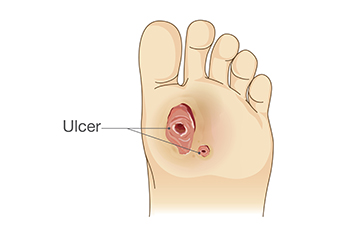
Diabetic foot ulcers, a common complication of diabetes, are open wounds that develop on the feet or lower legs, often due to poor circulation, nerve damage, or trauma. These ulcers can be slow to heal and prone to infection, posing serious risks if left untreated. Proper care is essential for managing diabetic foot ulcers and preventing complications. Begin by keeping the ulcer clean and dry, washing it gently with mild soap and water, and patting it dry with a clean towel. Apply an antibiotic ointment and cover the ulcer with a sterile dressing to protect it from further injury and reduce the risk of infection. Avoid putting weight on the affected foot and wear comfortable, well-fitted shoes to minimize pressure on the ulcer. Regularly monitor the ulcer for signs of infection, such as redness, swelling, or pus. If you are a diabetic and foot ulcers are a problem, it is strongly suggested that you are under the care of a podiatrist who can effectively treat these foot wounds and help you manage your diabetes.
Wound care is an important part in dealing with diabetes. If you have diabetes and a foot wound or would like more information about wound care for diabetics, consult with Michael Bess, DPM from Florida. Our podiatrist will assess your condition and provide you with quality foot and ankle treatment.
What Is Wound Care?
Wound care is the practice of taking proper care of a wound. This can range from the smallest to the largest of wounds. While everyone can benefit from proper wound care, it is much more important for diabetics. Diabetics often suffer from poor blood circulation which causes wounds to heal much slower than they would in a non-diabetic.
What Is the Importance of Wound Care?
While it may not seem apparent with small ulcers on the foot, for diabetics, any size ulcer can become infected. Diabetics often also suffer from neuropathy, or nerve loss. This means they might not even feel when they have an ulcer on their foot. If the wound becomes severely infected, amputation may be necessary. Therefore, it is of the upmost importance to properly care for any and all foot wounds.
How to Care for Wounds
The best way to care for foot wounds is to prevent them. For diabetics, this means daily inspections of the feet for any signs of abnormalities or ulcers. It is also recommended to see a podiatrist several times a year for a foot inspection. If you do have an ulcer, run the wound under water to clear dirt from the wound; then apply antibiotic ointment to the wound and cover with a bandage. Bandages should be changed daily and keeping pressure off the wound is smart. It is advised to see a podiatrist, who can keep an eye on it.
If you have any questions, please feel free to contact our office located in West Palm Beach, FL . We offer the newest diagnostic and treatment technologies for all your foot care needs.
